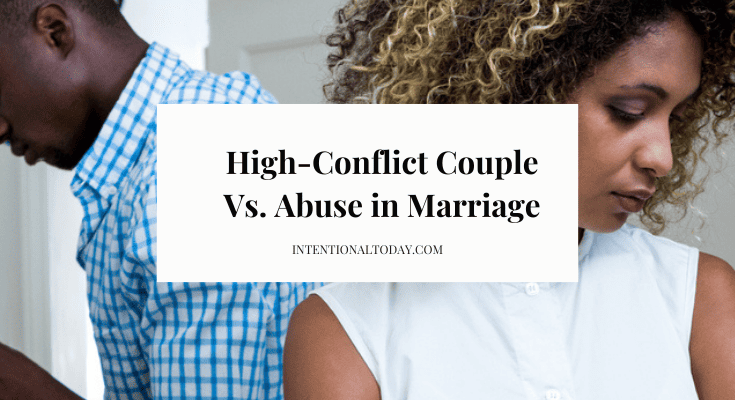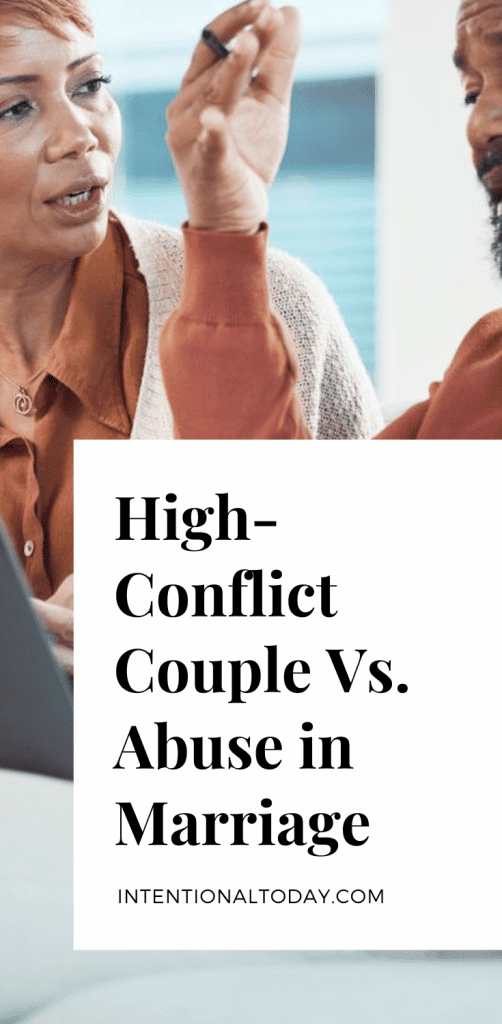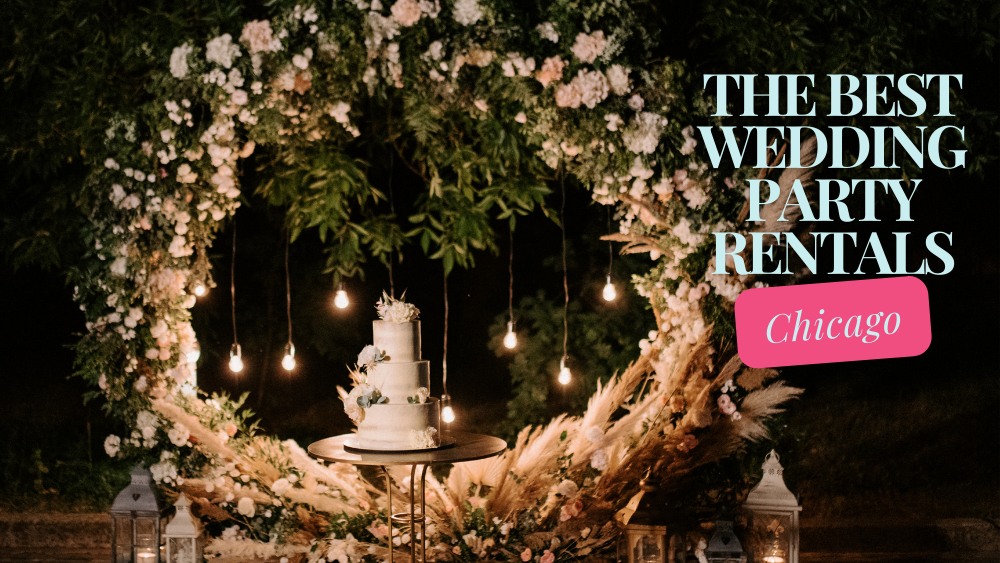Married Christians, just because your marriage weathered high conflict doesn’t mean every couple with high conflict can address their specific problems and have a good marriage.
The longer I’m in this space, the more I see Christians pulling from their personal experience in a high-conflict marriage and asserting all marriage hardship can be addressed and resolved.

They might say things like
“My husband and I used to (insert a marriage problem.) It was awful. We yelled, dished retaliation, retreated to our own worlds. We reached a breaking point and decided getting married was a big mistake. I moved out. Then, we decided to try therapy. The process was harder than we thought. But we kept working on ourselves. And the marriage. It took a while to get good (we had so much baggage), but now it’s been nine years of happiness, and I’m so glad we didn’t give up on us. Every couple will experience hardship and…(insert “solution” based on her experience.)
High-Conflict Couples vs Abuse in Marriage: The After-Story
Here’s what we need to understand. Just because you were a high-conflict couple (volatile and expressive in problems) doesn’t mean every couple out there with seeming high conflict has the same dynamic as yours and thus should expect the same results as yours.
Just because their problems seem familiar doesn’t mean they are dealing with a similar dynamic.
Undoubtedly, a high-conflict marriage is painful. It is. It can feel like the end of the world. It can feel like you made a mistake. The trauma responses (from past experiences), learned dysfunctional ways of relating pouring out can wear you down and feel like the death of your love.
But. If you experienced severe relationship hardship and now have a good, healthy afterstory, it means you were good people at the character level. Read More When a Spouse Won’t Address Harmful Character Issues (Clarity For Wives)
Though sometimes it felt like walking on broken glass relationally, you BOTH were the kind of people who can take responsibility for themselves and their choices. You saw the broken glass and ached about it and desired better. You cared. You wanted to be better human beings and partners and backed up your desires with action.
Two people (not one) took responsibility for behaviors and mindsets, got the needed help, showed up in the relationship as grown adults, and focused on learning how to operate within the boundaries of love, honor and respect.
This growing mindset and evolving choices altered the trajectory of a marriage. Both made the necessary changes and bore long-term fruit, which resulted in a happy, healthy after-story.
The desire to take responsibility for personal action/inaction, do whatever it takes to grow on the inside, and repair the hurt caused is something an abusive marriage (spouse) doesn’t have.*
High-Conflict Couples vs Abuse in Marriage: What We Need to Understand
You see, in overtly or covertly abusive situations, one person feels entitled to remain the same (no self-reflection, no growth) but expects their spouse to change and make massive accommodations for them. See 18 Things Normal Guys Don’t Do in Marriage (And 12 Things They Pursue)
There’s a power differential: one person holds the power, and the marriage functions on their terms. Their whims, their narrative, their control, their entitlements, their “permissions,” their addiction to power and exploitation.
There’s never repair (at least none that is genuine or lasting,) no real growth (“change” is often just a change of tactic,) and no desire to own up to anything or address the hurt caused.
An abusive relationship feels like enslavement, not like a life-giving connection. It is very much a “you die so I can live” type of operation: the abusive spouse is there for what they can get, not what they can give, and they are willing to suck their partner dry if that’s what it takes to maintain the status quo or have what they want.
And guess what? These “marriage issues” can look very much like “normal” marriage issues. They’ll look like regular issues and misunderstandings between two married people. They’ll present as typical growth areas. Read More 8 Toxic Beliefs Keeping Christian Women Trapped in Bad Marriages
That’s why abusive spouses thrive within faith environments because people of faith love to project goodness onto others.
We make assumptions: we assume everyone means what they say, give the benefit of the doubt (over and over again), and believe everyone deserves a second chance. Read More Why the Bible is not an Instruction Manual for Life and Relationships
It creates a heaven for abusers because they will never be called out or held accountable. They’ll walk around in sheepskin, pretending they are suffering from sheep issues (regular growth related human issues.) All the while, they have wolf issues (a ravenous, exploiting, murdering spirit.)
They’ll fool people. Deceive, because we Christians are not great at inspecting character or fruit and taking action based on that.We love words and keeping everyone feeling “loved” and not rocking the boat.
We don’t follow the rest of Scripture, which talks about exposing darkness, not associating with unrepentant sinners and harmers, or discerning wolves in sheep skin. (1 Cor 5:9-13, Ephesians 5:3-13)

Not Making Assumptions
This is why we must not assume that our issues are identical to other people’s and “counsel” others to follow our path: we don’t know what others are experiencing behind closed doors. Our hard-work=happy-outcome stories can cause real harm.
Want to help? A great way to help someone experiencing hardship in their marriage is to check if they are open to receiving a practical resource. (See recommendations below.)*
I’m not saying we can’t have convos with friends or trade lessons. I’m saying it helps always to remember that issues are different, and thus, the path to resolution or healing will look different, too.
If we want to help, truly help, we will do better: we will educate ourselves on abuse and trauma so we are better discerning around our loved ones. Then we can better sense when the veneer breaks, observe the not-so-obvious, and be a better witness overall.
We can do this. If we want to share our happy marriage stories, we must learn those other stories too.
Your turn: What do you think? High-conflict couples vs abuse in marriage: what are we missing? Let’s chat in the comments.
Recommendations:
*Marriage therapy is harmful where abuse is present.
*It is possible for some abusers to change. So, I’m not saying all formerly high-conflict marriages did not have abuse present. According to Lundy Bancroft, however, most abusive men do not make deep and lasting changes – in other words, most abusers do not change. Thus, the chances are that many Christians with a healthy-after story who try to speak into destructive marriages did not have a chronic, hardhearted, unrepentant abuser as a spouse. Because their spouse changed. Again, there may have been abuse, but when you consider that most abusers don’t change, it’s even more critical not to offer your good marriage story as a template for someone else’s relationship. (Here’s a helpful article by Dr. Andrew J. Bauman about The Spectrum of an Abuser.)




